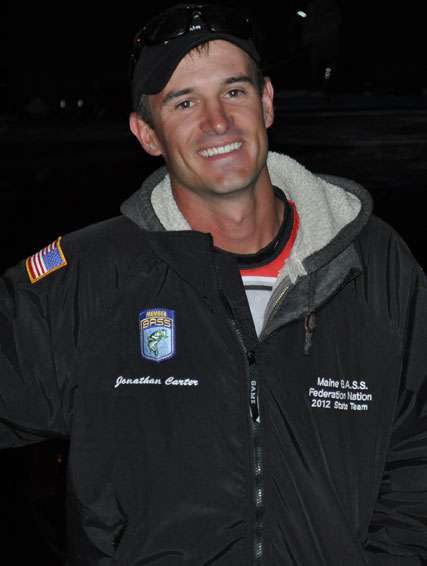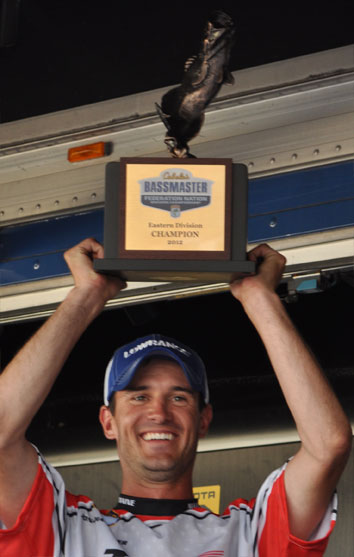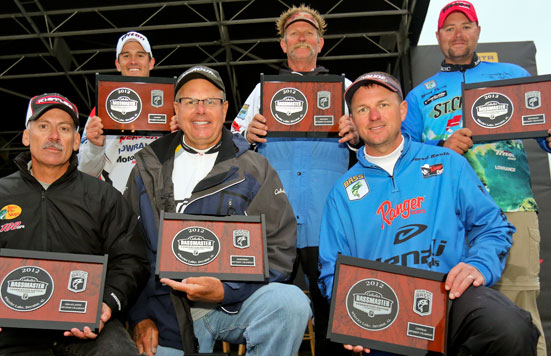
When 30-year-old aspiring bass pro Jonathan Carter launches his Bass Cat on the first day of the 2013 Bassmaster Classic, he’ll be breaking new ground. Not only will it be the B.A.S.S. Nation member’s first Classic, but he’ll also be the first angler – pro or amateur – to represent Maine in bass fishing’s biggest event, leaving only Alaska, Hawaii, North Dakota and Wyoming without representation in the tournament’s history.
“I don’t feel any pressure for the state,” he said. “We have a lot of good fishermen and I’m sure if I hadn’t made it, someone else would have. We’re blessed to have the fishermen we have up here. But I do put a lot of pressure on myself.”
Carter is accustomed to pressure, though, both on and off the water. He won the 2012 B.A.S.S. Nation Eastern Division Championship on the ultra-stingy Mystic and Charles rivers in Massachusetts, landing 10 legal bass over the course of three days to outlast the field. To give you a sense of how tough it was, the second-place finisher blanked on one of the competition days, and one competitor pushed on to the B.A.S.S. Nation Championship with just more than 10 pounds.
Two months after the divisional, Carter traveled 1,300 miles to fish the B.A.S.S. Nation Championship on Alabama’s Lake Wheeler, far outside the comfort zone of his home state; he finished ninth overall but first in his division by a margin of 13 pounds, easily claiming the Classic berth. Pressure hadn’t stopped the member of Maine’s Full Throttle Bassmasters yet. That’s because he’s been preparing for it his whole professional life.
Carter, you see, is a first-grade teacher, and the difficulties of putting five bass in the boat usually seem insignificant when you’re used to dealing with a room full of 6-year-olds.
“You have to be pretty patient to deal with them,” he said. “That helps with fishing.”
Of course the job also has its benefits, most notably having summers off, which allows Carter to fish six or seven days a week for three months before heading back to the classroom.
The patience developed as a teacher and a tournament angler came into play almost immediately after his triumphant experience at Wheeler. At the very time when he most wanted to hone his fishing skills, Carter was left with few places to pursue that goal. He could rig his boat and sort his tackle, but most of his regular fishing haunts were more suited for ice hockey than for pitching a jig. As of early January, he knew of one lake that was still open and he planned to get out on it as soon as possible to acclimate himself to what could be a frigid tournament next month. Not surprisingly, he’s hoping that the lack of a home court advantage he’ll suffer as a result of being far from home will be offset by conditions that make the anglers from more temperate locales like Florida, Alabama and Texas want to stay at the dock.
“You never really get used to it,” he said of wintry weather. “It’s more of a mental approach than anything. The last time I went fishing up here it was 13 degrees and a snowstorm.”
He’s not banking his entire set of Classic hopes on a hearty circulation, though. Because Maine’s fisheries are largely rivers and natural lakes, Oklahoma’s Grand Lake – like Alabama’s Wheeler before it – promised to be a somewhat foreign experience, so he took the only time he had before the cut-off to fly out to Oklahoma and scout out the tournament venue. That happened to be over the short Thanksgiving break from school. His brief time in the Sooner State was truncated as he sat in the airport waiting for his misplaced rod tube to arrive. He posted pictures on Facebook of a turkey dinner provided by the airlines and eaten off of a paper plate. The scouting mission was not worthless, though. Combined with information gleaned from public sources, he got a solid understanding of Grand’s layout and feels that he should perform well in the big show.
“It’s a pretty good pattern lake,” he said. “If you get something going, you’ll be able to make it work around the entire lake. I also like the fact that it’s a good fishery. It’s all going to depend on the weather.”
He’ll have the full backing of not only the Maine Federation Nation, but also “the overwhelming support of the students and staff” at Dyer Elementary in South Portland.
“All the kids know is that I’m fishing in a big tournament,” he said. “It’s something that I didn’t think they’d be able to relate to, but they all can. They don’t understand the level that this is at or what the benefits are, but they’re all rooting for me to win. They’re mostly concerned about me bringing back a big trophy.”

Assuming the Bassmaster Classic trophy ends up in his possession, it’ll have to take a long road back to Maine – about 1,700 miles worth, or in other words the trip to Wheeler plus a few hundred miles. And with the chance of inclement weather at either end of the trip, it could prove to be harrowing while pulling a boat. “I’m dreading the drive there,” Carter said, leaving open the possibility that the drive home, with the proper result, could be a lot less painful. The windshield time is something he’ll have to get used to if he wants to pursue his eventual goal of a slot on the Elite Series roster. “Up here in Maine we’re isolated in the fish world. Even fishing the Northern Opens everything is far. The closest major tournament lake is Champlain, and even that is six hours away.”
If he eventually enters the pro ranks, and participates in the largely-southern B.A.S.S. schedule, he may have to adapt to certain regional differences. “They don’t have quite the Northeastern pace down there,” he said. But as the first Mainer to make the leap, he’ll also have other cultural hurdles to overcome. B.A.S.S. social media guru Tyler Reed keeps reminding him “to remember to say y’all in interviews.”
Fellow 2013 qualifier Mark Dove, who also made it to the Classic through the Federation Nation in 1997, has warned Carter that “once you make the Classic you’ll spend the rest of your time trying to make it back.” The young angler took that advice to heart, but before he can look to the next Classic, he’ll have to make the first one count. He knows a little bit about firsts, and he’s itching to make a great first impression.

